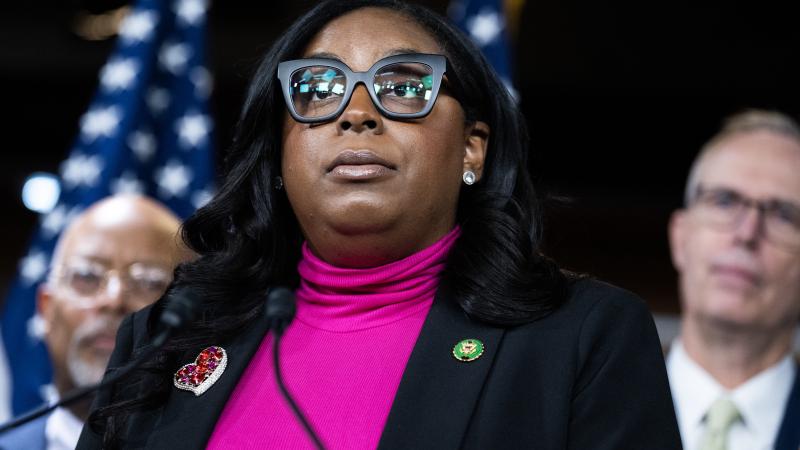With impending launch, Trump space program aims to counter China, Russia and boost private sector
'It’s very important militarily,' Trump said. 'We have the Space Force. From a military offensive and defensive standpoint, we are learning a lot.'
President Trump's wide-ranging efforts to boost American space exploration is part of the administration's strategic approach to strengthening U.S. positions against China and Russia while simultaneously supporting the domestic private sector.
The launching of NASA astronauts to the International Space Station on a commercial American rocket from Cape Canaveral, Fla. was delayed due to weather this week from Wednesday to Saturday. A successful Saturday launch would mark two new milestones in the Trump administration's ambitious space efforts: the first time since 2011 NASA has sent astronauts to space from U.S. soil and the first crewed flight ever by a private company.
Trump has also formed a new branch of the military, the Space Force, aimed at solidifying America’s advantage in space, revived the National Space Council, and prioritized the planning of the first manned mission to Mars.
“It’s very important militarily," Trump said Wednesday in Cape Canaveral. "We have the Space Force. From a military offensive and defensive standpoint, we are learning a lot. We have the most powerful rockets by far. We have the best of the world, the most brilliant people in the world — they are all right here."
NASA Administrator Jim Bridenstine noted that it has been nine years since the space shuttles were retired. “And the United States of America since then had no access to space with humans,” he said at the same gathering for the later-rescheduled NASA launch. “And now we’ve got great support from the administration. NASA's budgets in nominal dollars are as high as they’ve ever been. We’re bringing America back as it relates to human spaceflight.”
Bridenstine wrote in a Fox News op-ed on Tuesday about "a new lunar economy" and other economic initiatives the space program's growth could spur.
"NASA must lead in exploration for scientific discovery and go where there is not yet a commercial market," Bridenstine wrote. "With the right architecture, we will foster a new lunar economy, too. The scientific community has a huge appetite to study the moon. We will do so with robots and humans throughout this decade and inspire generations to come. Sustainable lunar exploration requires more than NASA, though; we also need commercial and international partners. And industry needs other customers. We are working with American companies to deliver new science and technology payloads to the lunar surface on commercial robotic flights beginning next year, paving the way for a human return in 2024. NASA is developing our powerful Space Launch System rocket and Orion spacecraft as the backbone for Artemis crew missions. Industry is designing and developing modern reusable human landing systems to take astronauts from lunar orbit to the surface of the moon. American companies will build and supply the Gateway, our new outpost in orbit around the moon."
Dr. Scott Pace, Deputy Assistant to the President and Executive Secretary of the National Space Council, told Just the News that expanded space exploration is helping fulfill strategic economic and national security goals, even in the midst of the global coronavirus pandemic.
"The United States is the world leader in innovation, and the president knows that effective leadership in space requires relying on and partnering with outstanding American entrepreneurs," Pace said. "That partnership is symbolized by the historic launch of Americans astronauts on the first-ever privately-owned crew transportation service to Earth orbit."
While tensions rise with China, another rising space explorer, Pace cautioned against labeling the U.S. buildup as a new "space race" reminiscent of the Soviet-era struggle.
“President Trump acknowledged that space has become a warfighting domain and that our way of life depends on protecting the nation’s vital space capabilities," Pace said. "We are not in a 'Space Race' with any country, but we are in a contest of values in space. This is a competition between like-minded free peoples and centralized authoritarian regimes who have demonstrated bad behavior with their neighbors, on the high seas, in international trade and in cyberspace. The challenge today is not just to demonstrate technical skills in space, but to lead a coalition of like-minded nations that are committed to creating a stable, secure, and prosperous future in space.”
Politically, some observers said the fact that the United Sates had under the Obama administration been relying on Russia for rides to the International Space Station undermined the alleged Trump-Russia collusion narrative. Pace did not respond to request for comment on that issue, though he said American, "independent" human space transportation was a strategic asset.
“The United States has good working relationships with many space agencies, and we remain partners with a common mission on the International Space Station," Pace said. "It would have been ideal to have a homegrown alternative means to send American astronauts to the International Space Station before the cancellation of the Shuttle program, but it has always been the plan for the United States to restore its capacity to launch astronauts without reliance on any other nation."
In foreign policy, a State Department spokesperson told Just the News that the Trump administration's space exploration goals were framed through the lens of a "whole-of-government approach."
"The President’s National Strategy for Space establishes forthrightly that securing the scientific, commercial, and national security benefits of space is a top priority for this administration," a State Department spokesperson told Just the News.
China expert and author Gordon Chang said America's new space buildup was just one of many battlefronts in an ongoing competition with China, which has expanded its own space program, including through its Long March 5, a Chinese heavy lift launch system.
"We are responding to China, not the other way around," Chang said. "America's new emphasis on space will not help build cordial relations with Beijing, but the other areas of contention, such as trade and intellectual property theft, are far more likely to result in a collapse of ties."
Chang said there was little doubt that China would move to make claims on international space the way it has on disputed natural and manmade islands in international waters.
"China wants to rule the moon and all of space, so we should assume they will claim the galaxy as theirs," Chang said.
“Thanks to President Trump, an American space renaissance is on the horizon," Ken Farnaso, deputy press secretary for the Trump campaign, told Just the News. "Not only is our military stronger than ever before, but we’ve prioritized American space dominance as we take bold steps towards engineering our future. Thanks to the president’s leadership, and the partnership between the public and private sector, Americans can rest assured that our astronauts are no longer dependent on Russian technology to bring them to space. At the end of the day, space security is national security, and with President Trump at mission control, the American space program can once again be the pride and joy of every citizen, and the envy of the world.”
The campaign also said in a press release that Trump's efforts "put America first in space," part of Trump's broader mission to "put America first" in trade and foreign policy. The campaign blasted rival presidential candidate Joe Biden, for a "decades-long record of bowing to Beijing."
During his 2008 presidential campaign, Biden said he wanted to "make China a full partner in space exploration" instead of a "frustrated new entrant that has to catch up with the United States."
The Biden campaign did not respond to request for comment from Just the News.
Maria Snegovaya, a post-doctoral fellow at the Johns Hopkins University School of Advanced International Studies, said U.S. moves to dominate space could put further strain on U.S.-Russian relations, however, she argued that the Trump administration had already been putting pressure on the Russian regime.
"This is a new step in the overall worsening relations between two countries somewhat reminiscent of Reagan-era arms races," Snegovaya told Just the News. "The U.S. is developing these technologies among other things to: 1) decrease reliance on Russia's equipment in space (restore the United States’ capacity to send humans to space after having relied on Russia for over a decade); 2) be able to counter Russia and China in case of conflict escalation (such as temporarily jam satellite signals in case of a conflict); 3) to push Russia into further arms racing in order to put pressure on Russia's budget (as Reagan's arms races did). I think the U.S. establishment has learnt from the experience with reset and is determined to contain Russia."














